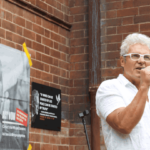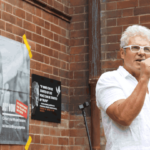Labor’s Crucifixion of Whistleblower Richard Boyle is Not in the Public Interest

ATO whistleblower Richard Boyle is set to stand trial in October, as the SA District Court ruled last Monday, 27 March, that he’s not protected from criminal prosecution due to the way in which he exposed the tax office unlawfully dipping into people’s bank accounts.
The ruling related to Boyle having argued the defence provided under section 10 of the Public Interest Disclosure Act 2013 (Cth), as, according to Judge Liesl Kudelka, the investigative methods he used to gather evidence aren’t protected under public service whistleblower laws.
But federal whistleblower law is broken. And the man who drafted this legislation, attorney general Mark Dreyfus, admits this. In fact, the nation’s chief lawmaker has already embarked on a complete overhaul of his decade-old laws that, now put to the test for the first time, clearly don’t work.
Dreyfus inherited three controversial whistleblower prosecutions on taking office last May. And while he dropped one, Boyle, a man who followed the process set out in the PID Act, was left to defend himself under dodgy laws, in an attempt to avoid spending the rest of his life in prison.
Boyle exposed an aggressive garnishee practice the tax office was unlawfully employing. And his actions, which were in the public interest, resulted in the practice being brought to an end.
However, in this country, no matter which major party is in office, whistleblowers who expose corruption tend to be strung up for their trouble.
No protection whatsoever
Originally suppressed, a redacted version of Kudelka’s reasons was released on Thursday. And the judge set out that the argument put by Boyle’s legal team in support of his actions would suggest, if upheld, that the PID Act permitted whistleblowers to deliver “vigilante justice”.
After the Australian Taxation Office directed staff to apply standard garnishee notices, usually reserved for habitual tax avoiders, across the board, Boyle understood that this was an unlawful attempt to raise more revenue that was harming the public.
Boyle prepared a public interest disclosure, which asserted the directive breached the Australian Public Service Code of Conduct contained in section 13 of the PID Act. And to prove his point, Boyle used photography and audio recordings in a manner the government claims was unwarranted.
The ex-ATO officer submitted the disclosure to his superiors. Yet, they dismissed his concerns and placed him under investigation. So, Boyle took his story to the press in mid-2018. And subsequent inquiries have supported his position and the garnishee practice has been brought to an end.
Boyle is now facing 24 criminal charges, which include covertly recording colleagues and unlawfully taking photos of client information. Although, when the Commonwealth Director of Public Prosecutions (CDPP) first came for him in January 2019, the man had been charged with 66 offences.
Kudelka found that the PID Act does provide Boyle immunity from civil, criminal or administrative liability when it came to making his public interest disclosure. However, for the way in which he gathered the evidence to support his case, she determined he’s still open for criminal prosecution.
A chilling effect
During a speech at the Australian Public Sector Anti-Corruption Conference in November, Dreyfus said that he was set to pass priority amendments to the PID Act by the end of the year. And this was just a month after Boyle had argued why he should maintain his liberty under the faulty laws.
Dreyfus, who drafted the PID laws during his last stint as AG in 2013, said, prior to the last election, that he was aware the laws were wanting. Yet, this understanding didn’t lead him to make any provisions for both Boyle and fellow whistleblower David McBride, who were set to utilise them.
The Public Interest Disclosure Amendment (Review) Bill 2022 is yet to pass the Senate, having made it through the lower house in February. And Dreyfus has indicated these initial changes are being made ahead of a more comprehensive overhaul of the PID Act later this year.
But the attorney general’s legislative move to protect whistleblowers is likely too late, as, with the treatment Boyle, McBride, Bernard Collaery and Witness K have all been subjected to, it’s more than likely future potential exposers of corruption will stay mum.
A bipartisan approach
Under then AG Christian Porter, the CDPP moved to prosecute Boyle, McBride, Collaery and K over 2018 and 2019. And on taking office last May, Dreyfus inherited three of the cases, after Witness K pleaded guilty and, on being convicted in mid-2021, was served a suspended sentence.
Whistleblower supporters were hopeful last year’s change to a Labor government might bring an end to the pursuit of these men who’ve exposed corrupt government practices. And this hope was only heightened when Dreyfus chose to bring the prosecution of Collaery to an end last July.
Section 71 of the Judiciary Act 1903 (Cth) empowers the attorney general to discontinue a prosecution against a person charged with “an indictable offence against the laws of the Commonwealth”.
Australians Against Political Prosecutions wrote to Dreyfus last August, asking him why he’d chosen to only drop one of the three key prosecutions, to which the AG advised that his power to end criminal prosecutions is reserved for “very unusual and exceptional circumstances”.
Dreyfus added that in terms of Boyle and McBride, they were “seeking to rely on the protections within” his whistleblower Act, and “the question of the applicability of immunities under the PID Act to their particular circumstances” was a matter “for the courts.”
Of course, the court found that Boyle was not protected under the laws that Dreyfus, having written himself, was all too keenly aware only provide the flimsiest of protections.
Human Rights Law Centre senior lawyer Kieran Pender has pointed out that in comparable countries Boyle would have been covered.
But in Australia, whistleblowers are all too often condemned for speaking out.
And while the public grew only too used to the disdain the Coalition treated the likes of Boyle, Labor, a year in, has proven itself to be yet another political entity that prefers to shoot the messenger, rather than punish the criminal.
Boyle is being persecuted by the authorities for speaking up about government corruption, and in turn, saving members of the public from unnecessary trauma. And his treatment serves as a warning to others in the public service to stay silent on wrongdoing or else lose your liberty.
Indeed, the prosecution against Richard Boyle should be dropped. But with Labor having left its conscience at the door on being elected, it seems whistleblowers will only become an increasingly endangered species.







